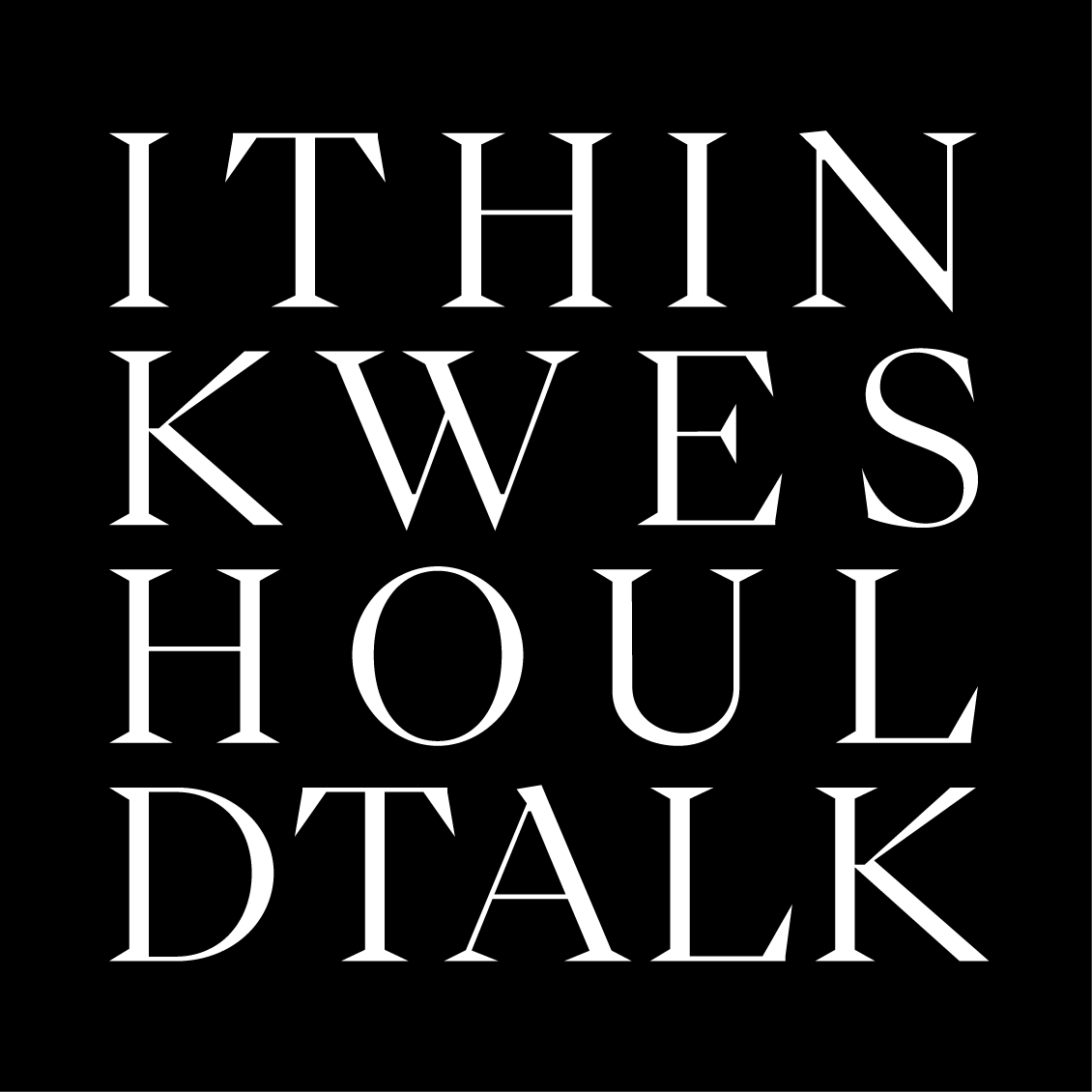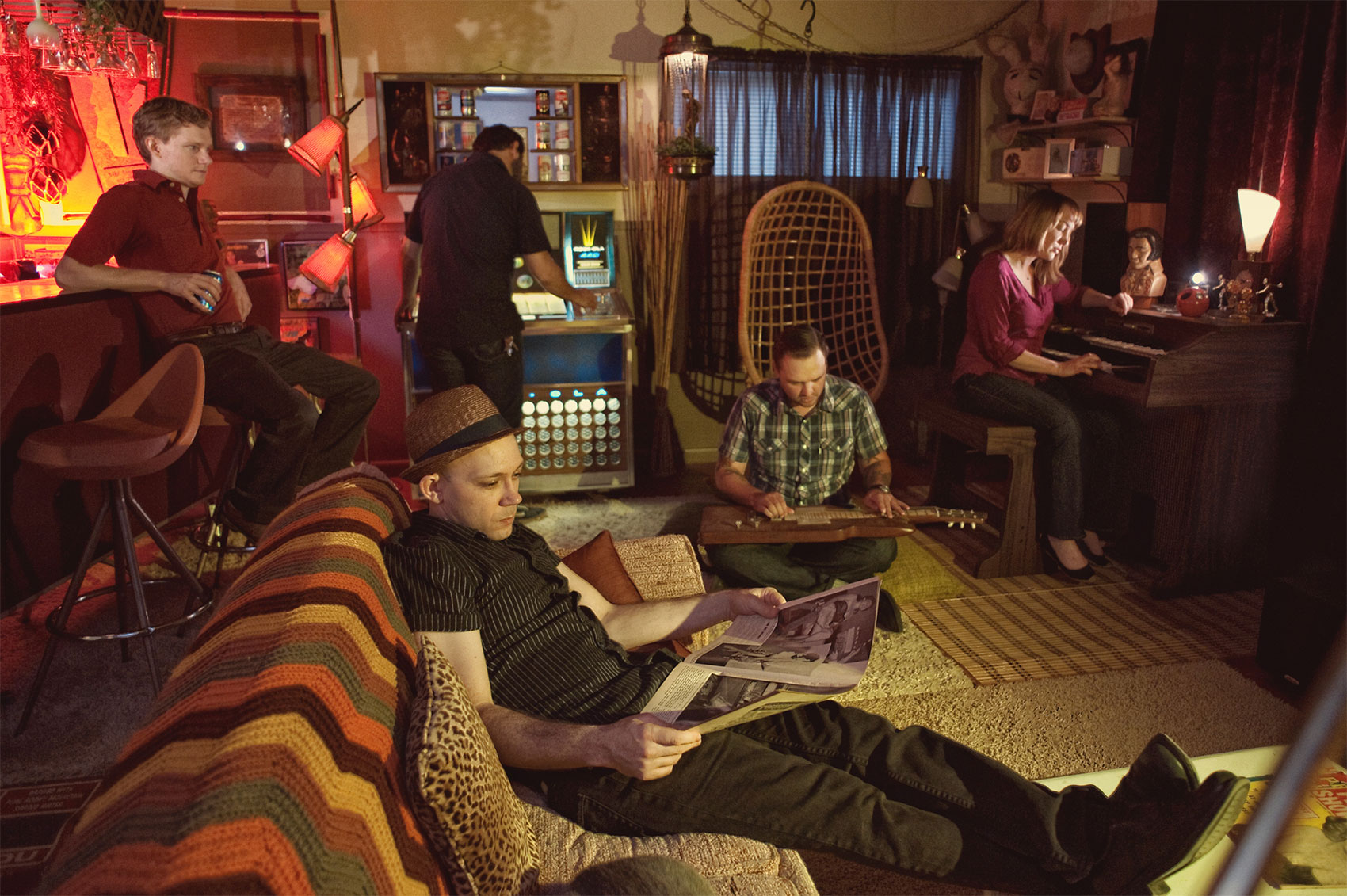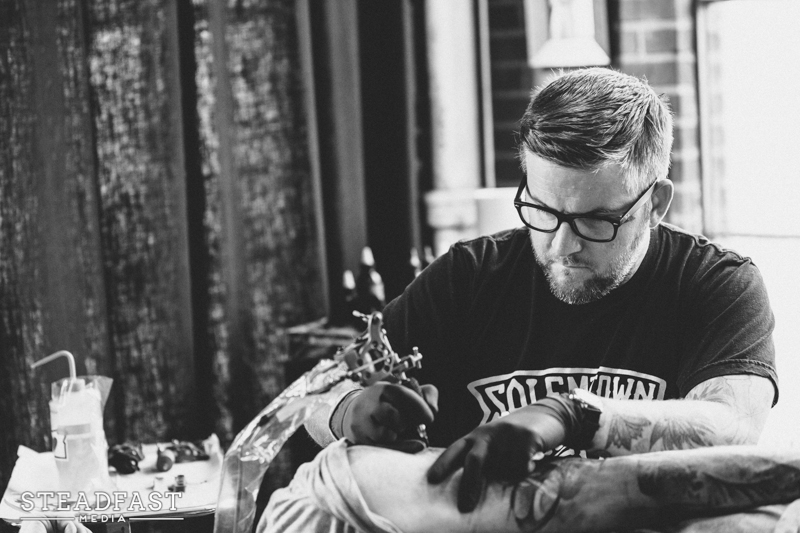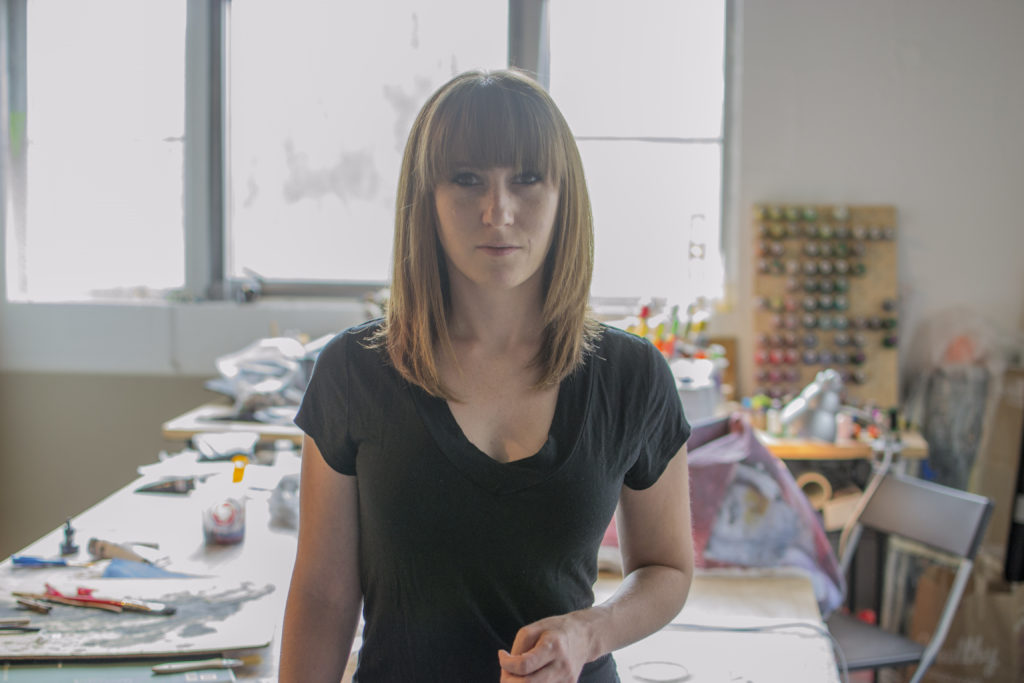Joey Kneiser —
I’ve probably seen Glossary play a hundred times, and I’ve known different members at different points in my life. I met Joey Kneiser many years ago late at night at a party in Murfreesboro, Tennessee where he gave me the tip to pick up a copy of David Berman’s book Actual Air, which I still try to read once a year.
I talked with Joey recently about the processes and challenges of a songwriter, inspiration, and how constant obsession fuels creative fire.
Glossary is a band from Murfreesboro, Tennessee. Formed in 1997, the band was created to have a purpose, an ideology, and to get humans together who love to create music. Glossary is Bingham Barnes (bass), Todd Beene (pedal steel, guitar, vocals), Eric Giles (drums), Joey Kneiser (vocals and guitar), and Kelly Smith (vocals, percussion).
You can pick up a complimentary copy of Long Live All of Us or Joey’s latest EP Moonlight for the Graveyard Heart. You can also see performances on Glossary TV.
Paul
Tell me a little bit about the conscious parts of your work and your process as a songwriter.
Joey
When it comes down to being a creative person, I think the person who can be alone the longest tends to be more developed in what they’re doing. It’s what creativity requires you to do. Unfortunately, if you’re going to be an artist in any way, it’s somewhat of a selfish endeavor. It’s very narcissistic and it’s about you expressing yourself. It attracts a certain kind of person because you have to spend an enormous amount of your time being alone.
Really, that’s my process: being by myself for long periods of time. Most of my songs develop out of playing and playing over and over again the same progression; pacing my house for hours and hours. It slowly develops. But that requires me to be by myself a lot to be really productive.
My process is different. It’s just work. I work a lot. I don’t believe in writer’s block or anything like that. You just have to work harder and you’ll write through it. Sometimes you need to take a break. I’ll go long periods of time when I won’t even try to write anything. Sometimes you have to let the bucket fill back up.
It’s not always fun to sit around and deconstruct yourself. I always say that I don’t really like writing songs, but I like having written songs. I have to go through the painful process to have written one.
The one thing in my life that I know I should be doing is this: holding my guitar.
Paul
It's an interesting balance of solitude and social, solitude and social. The singular you and the larger You.
Joey
Yeah. The main thing when I started the band, like I said before being an artist is really narcissistic and selfish, and the only way I could really justify it was that the songs had to be about something bigger than I was, and it had to be in search of some kind of connection to other people. I wanted a band to have some kind of ideology behind it, to have some sort of belief system. And that when people would hear the songs or knew we were coming out with a new record, they’d know. The people who really get us have tapped into that. The band really has a belief system behind it.
I always try to have the songs about the great attributes of human beings, which are simple things like forgiveness and redemption and love and second chances. Things that are very classic and human. I always write from that place.
Joey
You do something long enough, it becomes a part of who you are. Completely. This is all I’ve ever done, other than the four and a half years when I was in college and I was only playing around, not that far from Murfreesboro. Before and after, that’s all I’ve really done: try to pursue writing songs and playing music in some fashion. There wasn’t any B plan. I never really had envisioned a life outside of it. As I’ve gotten older, I start thinking ‘Shit, how am I going to do this forever?’ I’ve said many times that being an artist is like being in constant midlife crisis. You just don’t know what’s going to happen. You don’t know if you’ve made the wrong decision or if you’ve made the right decision or if you’ve tapped into something that other people haven’t. Or if you’re just a fool.
It’s very confusing. Especially when you get older. Rock and roll tends to be culturally attached to youth. As you get older it gets harder to justify, you’re figuring out ‘Should I still be doing this?’ We’ve been in the band since 1997. Started it as kids. The reason we keep doing it is because there’s something bigger in the band.
Bands that I like seem like they have something like that too. Like there’s some kind of band ideology, some kind of belief system that the band has. The people we really like, The Clash, The Band, The Rolling Stones, or the Replacements. Bands that seemed like they stood for something.
Being an artist is very much like being a child. You have to protect this naiveté about you where the world seems to have some kind of level of magic to it and some kind of intrigue.
Paul
I've noticed a lot of experimentation with the sounds, song formats, and styles on all of the Glossary records. They twist and turn over time. Calling it an evolution downplays the fact that it's all just part of the process.
Joey
There’s definitely some of those harmonized guitars, some metal, some things that bands like Thin Lizzy use a lot.
The idea wasn’t that we were going to start a band to be anything specific. We knew we’d be around for a long time we were just going to take all the music we like and try to cram it into our band in our own way. We all came from punk rock backgrounds. We were all into indie rock. We all loved country and bluegrass and hillbilly music and old R&B. We tried to put all the things we like into the band.
Those are the kinds of bands, like I said, that we really like. Like The Band. They had R&B and country and Garth Hudson was doing all the weird spacey stuff that made them kind of modern. And someone like The Clash who starts off as a punk band, and by the time they get to ‘Sandinista!’ they’re doing weird triply hip-hop and dub and reggae kind of stuff. Or like the Stones who had R&B and psychedelic stuff, into country and all the early seventies stuff where they sound like they’re from Alabama. Bands that are a hodgepodge of American music. That’s what we always thought we were.
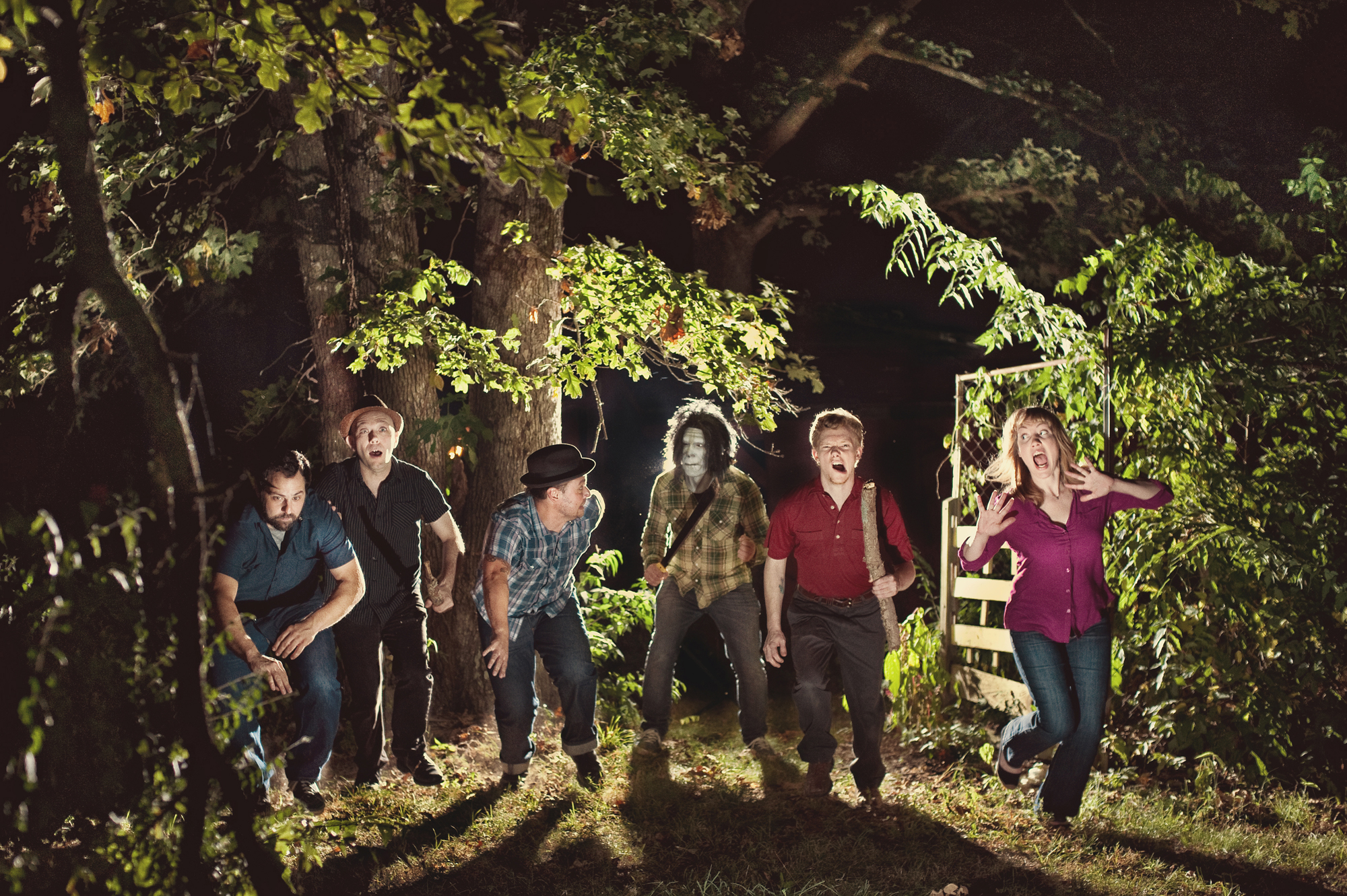
Glossary
Joey
To me, if I’m going to be a creative person, I have to constantly be stimulated. I’m constantly trying to find new things to be obsessed with. Whether it’s a record or a movie or a book or author or director. Something new to constantly keep my mind creative. Being an artist is very much like being a child. You have to protect this naiveté about you where the world seems to have some kind of level of magic to it and some kind of intrigue. There’s a lot of things you don’t know or think you know. You can’t be cynical or apathetic and actually think there’s still good. That’s the only way I can stay motivated to be creative in the way that I want to. That’s pretty much the main process by which my creativity comes.
When I was growing up I didn’t have music in my house. My parents never listened to music. There were six kids and two adults. My older brother listened to some metal in middle school and high school, but growing up there was no music. My dad was obsessed with movies. So the time you could even buy VHS we had this enormous five-thousand VHS library in my house. I grew up watching movies and being obsessed with movies.
When I heard music like 'Born to Run' or songs like that on the radio, that seemed like a mini-movie that you could paint visuals into music. That really was when it intrigued me and really made me want to play music. Since then, movies have had one of the biggest impacts on me and today is still one of my main obsessions. I think that constantly finding things like that keep me inspired, but also sitting by myself, strumming my guitar, coming up with a part, strumming it for hours. I don’t really write songs from a hook. In all my songs, the first line is the first line I came up with, then develop the song as I’m going along.
It’s a long process. I’m usually working on a multitude of songs at the same time. I’m a batch writer. When it’s time to go and I want to make a record, I work on all the songs at the same time. I don’t just write individual songs throughout the year. They’re all written within the same couple month span. I’ll have eight songs that are all half written, and when I get stuck on one I’ll move on to another one.
If you can pull off a song with just a dude playing it on a guitar, it exists. If you need all that other stuff to make it a song, is it really a song?
Paul
What are some of those influential films you’ve been obsessed with?
Joey
The Last Picture Show and Paper Moon … I was really into Terrence Malick, so Days of Heaven. I was in high school in the nineties, so things like Jim Jarmusch and Quentin Tarantino. The Last Picture Show is one of my favorite movies of all time. My dad was really into westerns too. I grew up watching tons of westerns. All those Sergio Leone films like Once Upon a Time in the West and other spaghetti westerns. John Carpenter is one of my favorites too. I remember going to the theatre and it blowing my mind. I was obsessed with Starman when I was twelve.
I feel like I learned the idea of narrative through watching movies. With a song, you only get a hundred words. Trying to cram a complex idea in such a small amount of time is extremely difficult.
Joey
My ideas were always trying to take some big idea and trying to figure out how I can simplify it down to its most basic terms. All the songs I’ve written in the last seven or eight years, the ones when I wrote the songs for Better Angels of our Nature, that was like when I was really trying to write much bigger ideas and trying to fit them into tiny spaces. The songs seem like they’re so simple and like they were written really quickly, but it was the exact opposite! It was some of the most grueling writing I’ve ever done in my entire life. Just chiseling away at something to not just make it three or four chords, really simple, but to make the words convey something very big. It was a very large undertaking for me.
There were bands like Nirvana or Credence Clearwater Revival, that if you just knew a couple of chords, you could figure out these songs really simply. Through the first pass, someone could learn to play them. They’re not that complex. Specifically, I remember writing ‘Shout it from the Rooftops’ which is literally four chords, working on it for months to get it to be so simple. And the lyrics, how do you criticize religion and embrace it at the same time in four chords and four minutes?
I realized at an early age, human beings are just naturally not content. It’s a defense mechanism that’s put in us that makes us want to wake up and keep living.
Joey
‘Only Time Will Tell’ was written when I had this obsession with Shelby Foote and his books on the Civil War. And I was obsessed with the Civil War at the time. This was around 2006 at the height of the Iraq War. Writing a song that could just be about people killing each other, not being able to figure out why it seems like human beings never learn anything. The mistakes they make. We all claim that we do, but nobody wants to admit they don’t. Sometimes it takes time passing to realize how much of a fuck up you’ve been.
‘Blood on the Knobs’ was just an autobiographical song about touring and playing shows. Knowing that you’re doing the right thing for you creatively and emotionally and that inner voice inside of you that guides you, telling me to do this. But then everything around me, outside of me is asking ‘Why am I doing this?’ That constant at odds of giving everything you have to something and constantly feeling like you may not be doing the right thing. Inside of me, there’s no doubt I’m doing the right thing. The one thing in my life that I know I should be doing is this: holding my guitar.
Paul
How have your expectations changed when it comes to what you get out of a song or from playing a show?
Joey
I’ve never really had high expectations in any of it. I’ve pretty much reached all the goals I’ve ever thought, from the time I started playing music. I wanted to be in a band. I wanted to put out records and go on tour. I wanted to play shows, and play good and put out records and go to Europe. Slowly, all those things happened.
I realized at an early age, human beings are just naturally not content. It’s a defense mechanism that’s put in us that makes us want to wake up and keep living. If you’re truly, truly content and there’s nothing left to try or want, that’s a dangerous place to be. I want to be motivated to continue pushing myself to do stuff. To not necessarily be complacent or content. But also, to not really ask for much. I don’t need much.
The work is really what I’m interested in: creating a life’s work that proves my existence. I want to have a pile of art that I leave behind that I’ve created here. If someone who is coming up behind me can figure out a little about themselves through it, then that’s what you do it for. I don’t need a bunch of stuff or accolades or to have people applaud me and tell me I’m great. I just want to have something to do while I’m here and make that something good and worthwhile.
If someone has an emotional connection to it, that’s really great. I started realizing years ago that Glossary was really more of a cult-type band. People who are into the band are really into the band. It’s an all or nothing kind of thing. People either don’t know who we are or don’t care, and the people who get it. They get it. And it means a lot to them. Not only the music, but like they’re really part of the band. Like they’re rooting for a band like this to exist. Our band is just five people who love music and started a band because they love music.
I never sit and think about what I’m doing. I let it go. The worst thing any creative person can do is to try and replicate a process. If you think too much about something you did that people love and you try to figure out how you did it so you can do it again, you’re just going to kill yourself! It’s impossible. I try not to think about that idea too much. I know a lot of people want to schedule themselves or want to have a drink when they write. I don’t think about anything like that. If you feel it and you think you’re going to get something out of it, you just do it. You go right then and do it. Pick the guitar up and go for it. Just try. There are a million ideas for songs around you if you just pay attention.
I’m not necessarily trying to express myself in songs. You can do that in other ways: what you eat, what you wear, what you like or listen to. With this, I want the music to find other people like me. That’s what playing music is. A fan is a friend. Someone you’re living parallel to. Someone who gets the same thing you get, who has this common understanding of something.
The one downside of being an artist and being obsessive-compulsive, especially a musician, but for anybody… you start it and the whole process is new and exciting. You find another artist who you really connect with, you wear that out. And then you come across another one. And then every couple of years, another one. It’s mind-blowing. You do that for twenty years, those spaces between finding mind-blowing artists become bigger. I’ve already had my Tom Waits phase, and my Randy Newman phase, my Bob Dylan phase, my Neil Young phase, Bruce Springsteen phase. I’ve already gone through the great songwriters and so now I’m into finding the new and more obscure stuff. I have to go and venture out of music to try to find that same feeling. It’s getting harder for me to find these. Recently I found Graham Parker and the Rumor and became obsessed with it. It was a huge dry spell of finding someone new to become obsessed with. So I started moving into editing and directing and cinematographers to become obsessed with.
